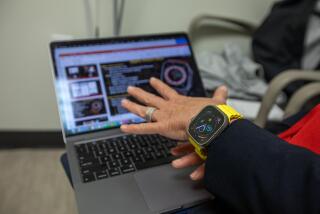Schroeder Out of Hospital--After 133 Days
- Share via
LOUISVILLE, Ky. — A nervous and excited William J. Schroeder was discharged Saturday from Humana Hospital Audubon to an apartment across the street, becoming the first artificial heart recipient to live outside a hospital.
Schroeder, 53, waved to reporters as he left amid sunny skies and brisk winds. When asked how he felt about leaving the hospital, he pumped his right fist in the air once.
The move to the specially equipped apartment came 133 days after his natural heart was removed. The first person to receive a Jarvik-7 heart, Seattle-area dentist Barney Clark, died 112 days after his implant in December, 1982. He never left the hospital.
Schroeder’s son, Mel, drove the van across busy Poplar Level Road behind a police escort. Several dozen neighbors and relatives watched his arrival.
“He went out to the front porch, and everyone started applauding. Then he started applauding,” Robert Irvine, Humana Inc. public relations director, said. “He was pleased. He was very animated.”
Although the move fell short of returning to his hometown of Jasper, Ind., Schroeder’s wife of 33 years, Margaret, said that they are used to making themselves feel at home in new quarters after traveling with the Air Force while her husband was in the service for several years.
‘We’re Going Home’
“Home is where we’re at. We’re going home,” Mrs. Schroeder told reporters several hours before the van ride to the furnished apartment provided by the for-profit Humana Inc. hospital chain, which runs Audubon and paid for Schroeder’s mechanical heart implant Nov. 25.
Humana, hoping to limit the excitement surrounding Schroeder’s long-delayed release, asked reporters not to question him.
Mrs. Schroeder said that her husband will take life “one day at a time.”
“Give Bill and the family and myself a chance to really put things together, then we’ll come out and meet with you,” she said. “Hopefully, Bill’s going to be able to talk with you too.”
Mrs. Schroeder, who has stayed at Audubon since her husband’s admission on Nov. 11, said that she is ready to take on additional duties monitoring his well-being.
“I’m kind of leery of it (the mechanical heart equipment) always,” she said, adding nevertheless that “I think I know what to do in case of emergency.”
In an emergency, such as the failure of the mechanical heart or a recurrence of the paralyzing strokes that Schroeder suffered on Dec. 13, help will not be far away. Nurses will live in an adjacent apartment in the two-story, four-unit complex, which is linked with the hospital by special equipment. Guards will patrol outside.
Dr. William C. DeVries, who implanted all three permanent artificial hearts ever used, said at the news briefing that it will be up to Mrs. Schroeder to decide how much nursing care her husband requires.
“We’ll be making house calls on him,” said DeVries, whose third mechanical heart patient, Murray P. Haydon, 58, of Louisville, is still recovering at Audubon from his Feb. 17 implant.
Susceptible to Seizures
Schroeder is susceptible to mild seizures that affect his control of his arms and legs or cause him to stare blankly, DeVries said, but he has not suffered one in a long time.
Schroeder continues to receive blood-thinning, anti-seizure and anti-depressant medicines, the doctor said.
Since his strokes last year, Schroeder has experienced “multiple episodes. Some of these have been seizures. Some of them have been maybe stroke variety,” DeVries said. Details will be published later in scientific journals.
Schroeder’s body has had problems building red blood cells, and he has occasionally required blood transfusions, DeVries said, adding that he believes Schroeder will need perhaps one transfusion a month.
DeVries said that Schroeder was somewhat apprehensive about leaving the hospital but was excited and happy about moving to the apartment, which looks out on a wooded middle-class neighborhood and a city park.
“It is indeed a great milestone for me personally as well as Bill Schroeder personally,” said DeVries, who explained that his patient is physically stronger and eating better. In addition, Schroeder’s memory has improved since his post-stroke period and a two-week fever in February.
Move Is First Step
DeVries said that the move is only a first step toward letting Schroeder return to his southern Indiana hometown 90 miles away. He said that it might take several months to prepare Schroeder to return to Jasper.
Schroeder is as strong as he has been in two months and can walk short distances, DeVries said, adding: “Every day he gets a little stronger, a little better.”
The family is accustomed to good days and bad, Mel Schroeder said.
“Either you’re laughing or you’re crying. There’s no in between, and a lot of time it seems like that,” he said.
More to Read
Sign up for Essential California
The most important California stories and recommendations in your inbox every morning.
You may occasionally receive promotional content from the Los Angeles Times.













